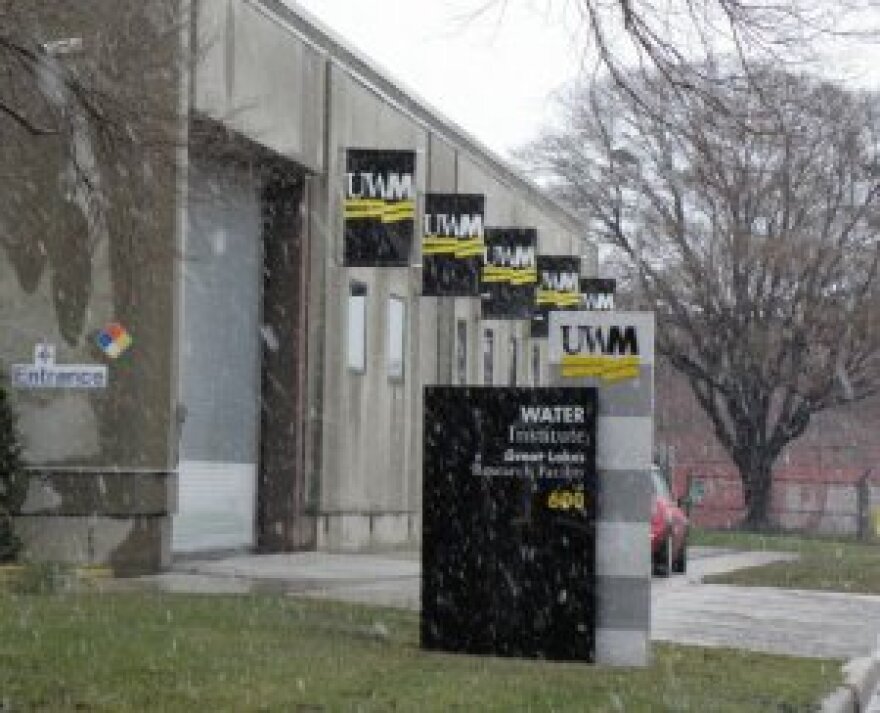If you have an idea for conserving or cleaning water -- or even using it -- Milwaukee could one day be the place to develop your invention.
That's the dream. A coalition of community leaders is pushing the city to become a global hub for water research and technology.
But is it really possible for a region to make itself the headquarters of an industry? And is there competition? We seek answers to those questions, in today's installment of Project Milwaukee: The Currency of Water. WUWM's Ann-Elise Henzl reports.
One of the most vocal cheerleaders for developing a water hub in Milwaukee is Rich Meeusen. He’s CEO of Badger Meter in Brown Deer, and co-chair of the Milwaukee 7 Water Council, a group promoting the idea.
Meeusen likes to talk about Disney World, when making his pitch.
"Disney in 1972 went to Orlando, they opened Disney World. The city fathers in Orlando had a meeting and said, 'Oh, we can build our region into a national, or even a worldwide tourist hub,'" Meeusen says.
Meeusen says they did just that.
"What they did was, they coordinated government tax incentives with zoning laws, with the industries that were there, with the schools. And now when you look at Orlando, you see that they have SeaWorld and Universal Studios and all of these other things there. In fact, the University of Central Florida in Orlando is the number-two rated university in the United States for tourism and hospitality management," Meeusen says.
Meeusen says the Orlando story illustrates how a community can build an industry cluster.
Gov. Jim Doyle chooses a different example.
"North Carolina is a state that in the 1980s really created a research hub, a triangle, that got a lot of profile and created a lot of jobs," Doyle says.
The North Carolina Research Triangle now employs more than 40,000 workers. Doyle believes water could be the centerpiece of Wisconsin's hub, in part because of the research facilities already operating here.

UW-Milwaukee's Great Lakes WATER Institute is located a couple miles south of downtown. Sandra McLellan is a scientist here.
"We have research going on that really covers a whole breadth of topics, that ultimately will be useful to industry to take some of those ideas and make them into practical applications: How can we have cleaner water? How can we conserve water? How can we monitor the water more easily? And all of those things will link together to produce communities that can have sustainable water resources," McLellan says.
There is worldwide demand for clean, plentiful water. Milwaukee’s been making a pitch at international conferences, to be the place where answers are sought. A bit of tax support is being thrown behind the marketing.
But critics say other regions, including in the U.S., could beat us to the punch.
University of Arizona Professor Robert Glennon wrote the book Unquenchable: America’s Water Crisis and What To Do About It. Glennon says arid parts of the country may be more motivated than Milwaukee to invest in answers to water problems.
"Places like Tucson or Santa Fe or San Antonio. Places in California have looked over the edge, seen the precipice, and said 'Let's solve this problem now,'" Glennon says.
In addition, other nations are rapidly developing water technology. Singapore, for instance, has an organization actively promoting that country as a global water hub. It's even offered to train engineers how to conserve water and control pollution.
Marc Levine says there are other reasons Milwaukee could lose the battle to specialize in water. He’s a professor at UW-Milwaukee’s Center for Economic Development. Levine questions the very idea of planning a hub's creation.
"It tends to be a kind of a fad-chasing, herd mentality approach to economic development, which I think researchers have generally shown doesn't really work," Levine says.
Levine says most successful hubs sprout up organically, and are not created by design.
"The one classic example of this which has failed many, many more times than it's succeeded is in the biotechnology sector, where biotech was seen as the holy grail for many regions around the country, and many regions promoted themselves as the 'next great biotech hub,'" Levine says.
Levine says, in fact, very few regions have seen that vision come to fruition. He says many more have thrown away millions of dollars, trying. We’ll have more Friday on the probabilities of Milwaukee succeeding in becoming a water hub.




